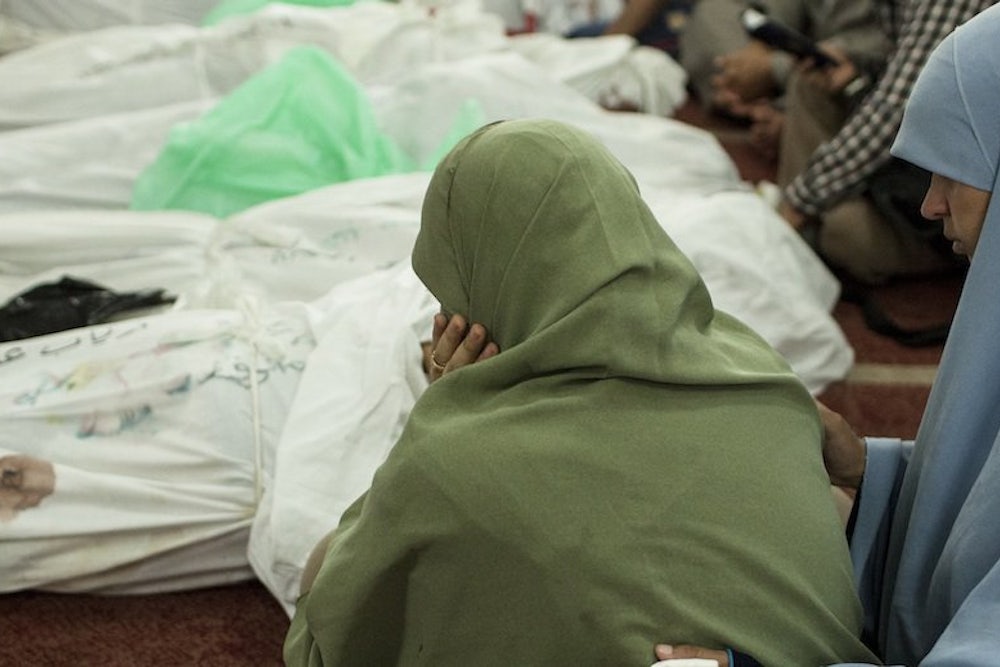CAIRO–On the floor near the back of the al Iman mosque that today serves as a makeshift morgue, four people—three women and one man—sit cross-legged surrounded by laptops, mobile phones, and bits of paper. Yesterday, the army and police stormed the two sit-ins in support of ousted President Mohamed Morsi with tear gas, bird shot, and live ammunition. Amid the chaos and bloodshed at the Rabaa el Adaweya field hospital, Nahla el Haddad and Alaa Mustapha, ages 25 and 21 respectively, took it upon themselves to collect the names and personal belongings of the dead. Since then they have gained two other volunteers and they are now a team of four.
All day Wednesday, they carefully placed the items—what little the protesters had on them—into plastic bags labeled with their names, which they recorded in an Excel spreadsheet. When the dead were carrying mobile phones it was particularly helpful, as it enabled the team to call family members to inform them of what had happened to their loved ones. During our interview, many people approached the group with names, asking them to check the list to see if friends and relatives were on it.
After the army stormed the field hospital with guns containing live ammunition and expelled everyone inside, they announced that people could return to collect their wounded and dead, Nahla says. (Meanwhile, no ambulances could get in, so bodies, dead and alive, were carried out in blankets by people on foot.) In that small window Nahla rushed to where she had left the plastic bags and took as many as she could, so that there would be some record kept of who had been there. Protesters at the sit-ins had come from all over the country and some families have yet to be notified.
Neither Nahla nor Alaa are members of the Brotherhood. In fact, both supported the June 30th protest movement that led to Morsi’s ouster. But Nahla said she had soon seen the influence of the remnants of the old regime and began supporting the Brotherhood from a humanitarian perspective after they were demonized in mainstream society. Her and Alaa's act of trying to faithfully and objectively record the facts of what happened at the Rabaa el Adaweya field hospital is a rare event in Egypt these days.
In Egypt, it is difficult to gather facts even in peaceful times, due to decades of living under an authoritarian regime where there were often serious and unpredictable consequences for disclosing information. But lately it has become near impossible. Ever since the June 30th protests that led to the military’s ouster of Morsi, there has been a deep and growing divide between supporters of the former president and those who believe that his removal from office was an expression of the popular will.
One of the main illustrations of this division has been in the Egyptian press. When the army took power they shut down several Islamist channels, and since then the state and independent outlets have shown unwavering support for the army and the military-backed government. When 51 Morsi supporters were killed by security forces outside the Republican Guard, the army said they were provoked and did little to attempt to justify what was, at the very least, a disproportionate use of force. Despite the overwhelming number of dead Morsi supporters, no one in the mainstream media questioned the military's line.
In keeping with this new reality, not a single one of the main Egyptian papers showed pictures of dead Muslim Brotherhood protesters this morning.
Meanwhile, the Muslim Brotherhood is not innocent of biased and faulty coverage. Following the Republican Guard killings, they used images of dead Syrian children, claiming they were Egyptians that had been killed in the shooting. This afternoon, Ikhwaneb, the official Muslim Brotherhood English-language website, retweeted tweets saying that the military is responsible for the burning of churches in Upper Egypt over the last 36 hours and that Islamists are being blamed unjustly. All reports coming out of upper Egypt suggest that the burnings were perpetrated by Islamists or Morsi supporters.
At the same mosque where Nahla and Alaa are working, bodies lie quietly decomposing in rows on the floor. Most of them were killed when the armed forces violently dispersed the pro-Morsi sit-ins that have gone on for over six weeks. Despondent family members sit around them, sometimes uncovering faces to see their loved ones for the last time. Islam states that dead bodies must be buried within 24 hours. Yet many remain uninterred. Several people report that the Ministry of Health has refused to issue death certificates unless their families agree to sign a form that says they died of natural causes or committed suicide. Some of the bodies at the scene are burned beyond recognition, as are some of the main buildings the sit-in occupied. Morsi supporters contend that this is a tactic used by the government to hide evidence of wrongdoing.
In the coming weeks it will be critical for Egyptians—and for others—to resist their ideological impulses, and instead to strive, hard, to get at the truth. Moving forward in any sort of peaceful way will be difficult in any case, with so much anger and loss of life. But it will be nearly impossible to do that, if no one can agree on even the most basic, common account of what happened here.
